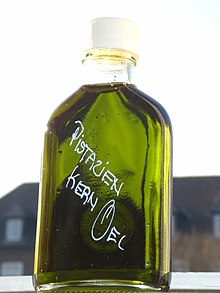
Pistachio oil is a pressed oil, extracted from the fruit of Pistacia vera, the pistachio nut.
Composition
In all vegetable oils, the composition can vary depending on the cultivar, environmental conditions, harvesting, and processing.
The intense coloration, very characteristic of pistachio oil, is due to the content of chromophores, particularly chlorophyll and carotenoids. The total carotenoid content has been reported to be 15 - 61 mg/kg, with the main components in order of concentration being lutein, β-carotene, neoxanthin, luteoxanthin, and violaxanthin. The luteoxanthin content apparently increases, becoming the main species, in cold-pressed oils. The total chlorophyll content is much higher in pistachio oils extracted with solvents. The chlorophyll content is 128-200 mg/kg in solvent-extracted oils and 12-50 mg/kg in "virgin" oils, with the main components being chlorophyll a, chlorophyll b, pheophytin a, and pheophytin b.
The high concentration of monounsaturated and polyunsaturated fatty acids makes it susceptible to auto-oxidation, which can be delayed by naturally present tocopherols or added antioxidants. The total sterol concentration detected in unrefined oils is 1840-4500 mg/kg. Other minor components of pistachio oil found in some studies include squalene, phenols with aldehydes, terpenes, and alcohols that give it a characteristic aromatic note.
Culinary uses
Compared to other nut oils, pistachio oil has a particularly strong flavor. Like other nut oils, it tastes similar to the nut from which it is extracted. Pistachio oil is high in Vitamin E, containing 19mg/100g. It contains 12.7% saturated fats, 53.8% monounsaturated fats, 32.7% linoleic acid, and 0.8% omega-3 fatty acid. Pistachio oil is used as a table oil to add flavor to foods such as steamed vegetables.
Manufacturing uses
Pistachio oil is also used in skin care products.
References
- ^ Rabadán, Adrián; Álvarez-Ortí, Manuel; Gómez, Ricardo (2018-08-01). "Characterization of pistachio oils and defatted flours regarding cultivar and geographic origin". Journal of Food Composition and Analysis. 71: 56–64. doi:10.1016/j.jfca.2018.05.008. Retrieved 2019-12-10.
- Givianrad, M. H.; Saber-Tehrani, M.; Mohammadi, S. A. Jafari (2013-03-30). "Chemical composition of oils from wild almond ( Prunus scoparia ) and wild pistachio ( Pistacia atlantica )". Grasas y Aceites. 64 (1): 77–84. doi:10.3989/gya.070312. Retrieved 2019-12-10.
- Ramadan, Mohamed Fawzy (8 May 2019). "Virgin Pistachio (Pistachia vera L.) Oil". Fruit oils : chemistry and functionality. Springer. pp. 181–198. ISBN 978-3-030-12473-1. OCLC 1100588295. Retrieved 2019-12-10.
- Sonmezdag, Ahmet Salih; Kelebek, Hasim; Selli, Serkan (2018-02-01). "Pistachio oil (Pistacia vera L. cv. Uzun): Characterization of key odorants in a representative aromatic extract by GC-MS-olfactometry and phenolic profile by LC-ESI-MS/MS". Food Chemistry. 240: 24–31. doi:10.1016/j.foodchem.2017.07.086. PMID 28946268. Retrieved 2019-12-10.
- "Benefits of Pistachios". Fastachi. Retrieved 2024-04-20.
- Salvo, Andrea; La Torre, Giovanna Loredana; Di Stefano, Vita (2017). "Fast UPLC/PDA determination of squalene in Sicilian P.D.O. pistachio from Bronte: Optimization of oil extraction method and analytical characterization". Food Chemistry. 221: 1631–1636. doi:10.1016/j.foodchem.2016.10.126. hdl:11573/1371350. PMID 27979139. Retrieved 2019-12-10.
- "Virgin pistachio oil". Archived from the original on 2006-06-19.
- The Nutrition Source - Recipes from Harvard University School of Public Health. Retrieved June 2009.
| Edible fats and oils | |||||||||||||
|---|---|---|---|---|---|---|---|---|---|---|---|---|---|
| Fats |
| ||||||||||||
| Oils | |||||||||||||
| |||||||||||||
This vegetable oil-related article is a stub. You can help Misplaced Pages by expanding it. |